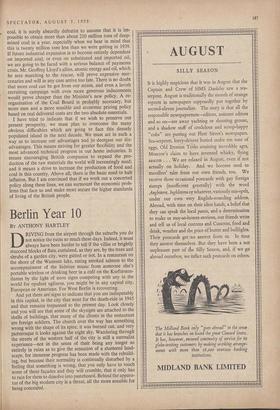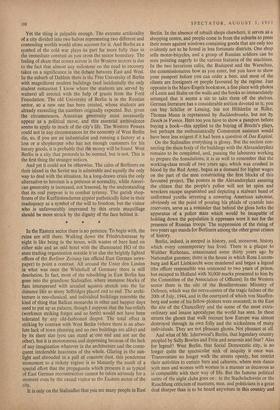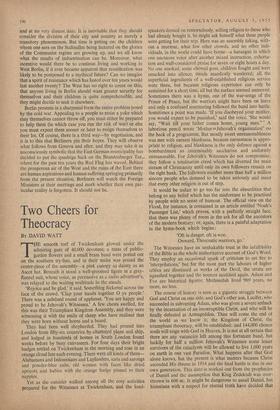Berlin Year 10
BY ANTHONY HARTLEY DRIVING from the airport through the suburbs you do not notice the ruins so much these days. Indeed, it must always have been harder to tell if the villas or brightly stuccoed blocks of flats, curtained, as they are, by the trees and shrubs of a garden city, were gutted or not. In a restaurant on the shore of the Wannsee lake, eating smoked salmon to the accompaniment of the hideous music from „someone else's portable wireless or drinking beer in a caf6 on the Kurfiirsten- damm by the light of neon signs competing with any in the world for opulent ugliness, you might be in any capital city, European or American. For West Berlin is recovering.
And yet there are signs to indicate that you are indisputably in this capital, in the city that went for the death-ride in 1945 and that remains trepanned to the present day. Look closely and you will see that some of the skysigns are attached to the shells of buildings, that many of the clients in the restaurant are foreign soldiers. The church over the way has something wrong with the shape of its spire; it was burned out, and very picturesque it looks against the night sky. Wandering through the streets of the western half of the city is still a surrealist experience—not in the sense of their being any longer so entirely in ruins as to give the sensation of a shattered land- scape, for immense progress has been made with the rebuild- ing, but because their normality is continually disturbed by a feeling that something is wrong, that you only have to touch some of these facades and they will crumble, that it only has to rain for them to dissolve into pasteboard. Behind the appara- tus of the big modern city is a threat, all the more sensible for being concealed. Yet the thing is palpable enough. The extreme artificiality of a city divided into two halves representing two different and contending worlds would alone account for it. And Berlin as a symbol of the cold war plays its part far more fully than in the immediate contrast as you cross the sector boundary. The feeling of sham that conies across in the Western sectors is due to the fact that almost any milestone on the road to recovery takes on a significance in the debate between East and West. In the suburb of Dahlem there is the Free University of Berlin with magnificent modern buildings (and incidentally the only student restaurant I know where the students are served by waiters) all erected with the help of grants from the Ford Foundation. The old University of Berlin is in the Russian sector, so a new one has been created, whose students are already exceeding the numbers originally expected. But, given the circumstances, American generosity must necessarily appear as a political move, and this essential ambivalence seems to apply to much of the city's life. The Western Powers could not in any circumstances let the economy of West Berlin die, so, if you are an industrialist and running a factory at a loss or a• shopkeeper who has not enough customers for his luxury goods, it is probable that the money will be found. West Berlin is a city that pretends to be normal, but is knot. This is the first thing the stranger notices.
And yet it could not be otherwise. The calm of Berliners on their island in the Soviet sea is admirable and equally the only way to deal with the situation. In a long-drawn crisis the only alternative to heroism is a pretence at normality, while Ameri- can generosity is increased, not lessened, by the understanding that its real purpose is to combat tyranny. The garish shop- fronts of the Kurftirstendamm appear pathetically false in their inadequacy as a symbol of the will to freedom, but the visitor who is unfavourably impressed by this crude maquillage should be more struck by the dignity of the face behind it.
In the Eastern sector there is no pretence. To begin with, the ruins are still there. Walking down the Friedrichstrasse by night is like being in the moon, with wastes of bare land on either side and an odd hotel with the illuminated HO of the state trading organisation outside it or else the brightly lighted offices of the Berliner Zeitung (an official East German news- paper) to point a contrast. All around the Unter den Linden in what was once the Whitehall of Germany there is still desolation. In fact, most of the rebuilding in East Berlin has gone into the grandiose Stalinallee, where immense blocks of flats interspersed with arcaded squares stretch into the far distance like so many Selfridges placed end to end. The archi- tecture is neo-classical, and individual buildings resemble the kind of thing that Balkan monarchs in other and happier days used to put up as palaces, though I suppose that the bas-reliefs (workmen striking forges and so forth) would not have been tolerated by any old-fashioned despot. The total effect is striking by contrast with West Berlin (where there is an abso- lute lack of town planning and no two buildings arc alike) and by its sheer size (you can stand at one end and not see the other), but it is monotonous and depressing because of the lack of any imagination whatever in the architecture and the conse- quent intolerable heaviness of the whole. Glaring in the sun- light and shrouded in a pall of concrete dust, this ponderous monument to a rickety regime is so blatantly the result of a special effort that the propaganda which presents it as typical of East German reconstruction cannot be taken seriously for a moment even by the casual visitor to the Eastern sector of the city.
It is only on the Stalinallee that you see many people in East Berlin. In the absence of rebuilt shops elsewhere, it serves as a shopping centre, and people come in from the suburbs to press their noses against windows containing goods that are only too evidently not to be found in less fortunate districts. One shop sells motor-bicycles, and a group of Russian soldiers can be seen pointing eagerly to the various features of the machines. In the two luxurious cafés, the Budapest and the Warschau, the commissionaires bow as you enter, but you have to show your passport before you can order a beer, and most of the clients are foreigners or people favoured by the regime. Just opposite is the Marx-Engels bookstore, a fine place with photos of Lenin and Stalin on the walls and the books so immaculately arranged that it seems a sin to take them off the shelves. German literature has a considerable section devoted to it; you can buy Schiller or Lessing, but not Holderlin or Rilke; Thomas Mann is represented by Buddenbrooks, but not by Death in Venice. Here too you have to show a passport before buying a book—this applied to the buying of Brecht's plays, but perhaps the enthusiastically Communist assistant would have been less exigent if it had been a question of Das Kapital.
On the Stalinallee everything is glossy. But the section con- necting the main body of the buildings with the Alexanderplatz remains to be completed, and, passing the labourers working to prepare the foundations, it is as well to remember that the working-class revolt of two years ago, which was crushed in blood by the Red Army, began as a demand for higher wages on the part of the men constructing the first blocks of this favoured project. The posters in the Alexanderplatz assuring the citizen that the people's police will not let spies and wreckers escape unpunished and depicting a stalwart band of uniformed youths arresting a cowering American saboteur, obviously on the point of pouring his phials of cyanide into reservoirs, serve as a reminder that behind the gloss lurks the apparatus of a police state which would be incapable of holding down the population it oppresses were it not for the presence of Russian troops. The suppression of the rising of two years ago stands for Berliners among the other great crimes of history.
Berlin, indeed, is steeped in history, and, moreover, history which every contemporary has lived. There is a plaque to Walther Rathenau, assassinated some thirty years ago by Nationalist gunmen; there is the house in which Rosa Luxem- burg and Karl Liebknecht were murdered and began a legend (the officer responsible was sentenced to two years of prison, but escaped to Holland with 30.000 marks presented to him by the Committee of the Association of Officers). In the Western sector there is the site of the Bendlerstrasse Ministry of Defence, which was the nerve-centre of the tragic failure of the 20th of July, 1944, and in the courtyard of which von Stauffen- berg and some of his fellow-plotters were executed; in the East the site of the Chancellery and the scene of the most extra- ordinary and insane apocalypse the world has seen. In these streets the ghosts that walk recount how Europe was almost destroyed through its own folly and the wickedness of many individuals. They are not pleasant ghosts. Not pleasant at all.
And what of Mr. Isherwood's Berlin, that legendary country peopled by Sally Bowles and Fritz and neurosis and fear? Alas for legend! West Berlin, that Social Democratic city, is no longer quite the spectacular sink of iniquity it once was. Transvestists no longer walk the streets openly, but restrict their activities to certain bars and cabarets, where men dance with men and women with women in a manner as decorous as is compatible with their way of life. But the famous political satire of the night clubs goes on : in the Stachclschwein or the Rauchfang criticism of manners, men, and politicians is a great deal sharper than is to be heard anywhere in this country and as cruelly witty as its Parisian equivalent. The scepticism of the Berliner, always considerable even under Hitler, has been sharpened by the near-destruction of the city and by the years that have seen as complete a reversal of alliances as anything that took place in the time of Frederick the Great. In a country so given to ready obedience to authority this spirit of irrever- ence is encouraging. Germany can do with some esprit f rondeur.
Tension, of course, there is, though the causes are different from those that prevailed in the Twenties and Thirties. In the East it comes from tyranny and in the West from fear of that tyranny. As the loudspeakers on the underground system announce that this is the last station in the Western sector, it is difficult not to feel that you are venturing into territory which, if not for yourself, then for some of your fellow- passengers, is a land of darkness. The flow of refugees from East to West. the odd Pole or Czech who manages to make it across the frontiers, the activity displayed by police and intelli- gence services, do not make for calm. It is sometimes said that the main industry of Berlin is espionage, and the visitor tends to let his imagination create the furtive atmosphere of Eric Ambler land, where perhaps none exists. Or does it?
Of course, the tourist can, if he likes, behave like a visitor to an ordinary capital. He can go to see (indeed he should go to see) the treasures of the old Kaiser Friedrich's Museum, now housed in Dahlem. In spite of the losses suffered by the pictures stored in the notorious flak tower (some were burned and others stolen), the magnificence of the collection remains. The Chardins, with their calm classicism, rebuke a world that subjected them to danger of destruction, and Watteau's Voyage Cythere is as fresh as if it had never seen the inside of a Bohemian salt mine. But what losses ! The Pergamon marbles are gone and the jewellery Schliemann brought from Troy and Mycenae. Still, the marvel is that all was not consumed; it must have taken devotion to save pictures and sculpture during the sack of the city.
From the cultural point of view Berlin is still a capital city. There are plenty of theatres, there is the opera (both in the East and the West) and there are cinemas where, in spite of the bad German habit of dubbing foreign films, there are, from time to time, good ones to be seen (the native film in- dustry is still abysmally bad). What with the lakeside beaches and bathing (if you can avoid the apparently formidable con- centration of bacteria, against which large potices only too frequently warn bathers) there is plenty to do. Berlin, that large, sprawling garden city, is a pleasant place to be in what- ever may be going on beneath the surface.
Yet, it is impossible completely to ignore what is going on beneath the surface. Berlin faces any thinking person with an insoluble dilemma. For this is the point at which the Western allies are most right both morally and tactically in their con- duct of the cold war. The East German regime has strictly nothing to be said for it. It is a sordid tyranny kept in place by Russian bayonets and justified neither by popular support nor by economic or social achievements. But then what? To force the Russians to relax their grip on East Germany (as from the latitude of Berlin one tends to think they should be forced) would create a war in which the issue of freedom versus tyranny would be lost in a radio-active welter. Berlin over- simplifies the issues to a point where there is no answer, where debate appears to be between right and wrong. It is difficult to see this without feeling torn by the conflict of justice and self- preservation. And then there is another factor; Berliners not merely want reunification passionately, they also believe in it and at no very distant date. It is inevitable that they should consider the division of their city and country as merely a transitory phenomenon. But time is getting on; the children Whom one sees on the Stalinallee being lectured on the glories of the Communist regime are growing up. and we all know what the results of indoctrination can be. Moreover, what incentive would there be to continue living and working in West Berlin, if it ever became apparent that reunification was likely to be postponed to a mythical future? Can we imagine that a spirit of resistance which has lasted over ten years would last another twenty? The West has no right to count on this; that anyone living in Berlin should want greater security for themselves and their children is quite comprehensible, and they might decide to seek it elsewhere.
Berlin presents in a sharpened form the entire problem posed by the cold war. Appealing to a people to resist a yoke which they themselves cannot throw off, you must either be prepared to help them (in which case you run the risk of war) or else you must expect them sooner or. later to resign themselves to their lot. Of course, there is a third way—by negotiation, and it is to this that Berliners pin their hopes. They will observe what follows from Geneva and after, and they may take it as unconsciously symbolic that the East German municipality has decided to put the quadriga back on the Brandenburger Tor,. where for the past ten years the Red Flag has waved. Behind the prosperous air of the West and the ruins of the East there are human aspirations and human suffering springing primarily from the present situation. Berliners will watch the Foreign MiniAers at their meetings and mark whether their own par- ticular reality is forgotten. It should not be.





































 Previous page
Previous page